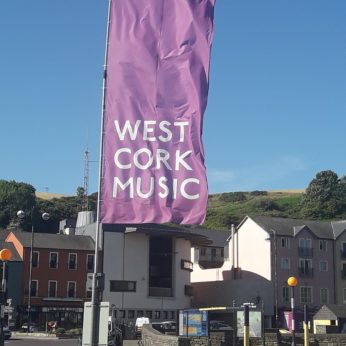Composer: Francesca Caccini (b. 1587 - d. 1641)
Performance date: 30/06/2019
Venue: St. Brendan’s Church
Composition Year: 1587 - 1641
Duration: 00:02:34
Recording Engineer: Gar Duffy, RTÉ
Instrumentation Category:Baroque Ensemble
Instrumentation Other: s-solo, 2vn, vc, hpd
Artists:
Ensemble Dagda (Clodagh Kinsella [soprano], Caitríona O'Mahony, Marja Gaynor [violins], Norah O'Leary [cello], Kieran Finnegan [harpsicord]) -
[baroque ensemble]

The
daughter of the man who literally wrote the book on singing, Francesca
Caccini had a life in which music from the first played a large part.
Initially known as a singer in her family consort, she was famed for the
accuracy and lightness of her trills and other ornaments, all in
accordance with Giulio Caccini’s Le Nuove Musiche. As a
young woman, Francesca Caccini’s talents were sought after by Henri IV
of France and his Medici queen among others. She found patronage in the
powerful women of the Medici court at the time, particularly Christina
Grand-Duchess of Lorraine the sometimes regent and de facto ruler
of Tuscany. Caccini is considered to be the first female writer of
opera, and it is noteworthy that, from what we know of her ballet and
opera, they often seem to have been based around powerful voices of
female characters. Caccini’s surviving book Il primo libro delle musiche contains a variety of arias on the principal forms of the day, with a fondness for structures such as the Romanesca.
Caccini
had another important patron in Archduchess Maria Magdalena, and while
of course sacred in roots, this work might well have been intended to
flatter the ears of Caccini’s earthly patron Maria. While Francesca was
most definitely in the nature of a commodity at varying points in her
life – her father trading on her success, the arguments between the
French court and the Medicis for her services – her own powerful
personality saw her recognised first and foremost as a skilled artisan.
Her marriages were of course arranged by the court and her father, first
to another musician and later to a nobleman. Francesca was responsible
for much of the household income in her first marriage, but lived very
respectably. In contrast, the religious institutions of Caccini’s
Florence under the patronage of Grand-Duchess Christina saw increasing
scandals, and the divisions between the convent and the outside world
becoming ever thinner. A nun to whom Francesca taught singing was at one
time found in her cell with the husband of Christina’s lady-in-waiting.
By his account, they sang Romanescas together.
|
Maria dolce Maria, come soave tanto |
Mary, sweet Mary whose name is so lovely, |
|
che pronunciar t?in paradisi core, |
it takes your heart to Paradise, |
|
Nome |
Sacred and holy name, |
|
chel cor minfiammi di celeste amore, |
you inflame my heart with celestial love, |
|
‘Maria’ |
‘Mary,’ I ever sing, |
|
ne puo la lingua mia piu felice parola, |
No happier word |
|
trarmi dal sen gia mai che dir, |
can my tongue deliver from my breast, |
|
che dir |
than when I say ‘Mary,’ |
|
nome chogni dolor temprae consola, |
name which tempers and consoles every |
|
voce tranquilla chogni affano acqueta, |
calm voice which assuages every disquiet, |
|
chogni cor fa sereno, ognalma lieta. |
composes every heart, which gladdens every |
Copyright © 2024 West Cork Music. All rights reserved.
Designed and developed by Matrix Internet